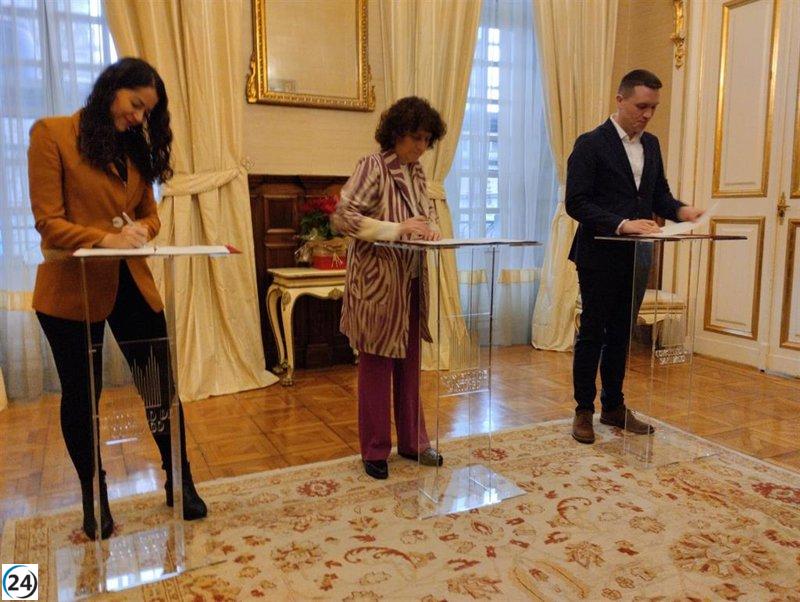"Políticas de conservadurismo presupuestario en Santiago: Inundaciones, bicis eléctricas y ruido en el foco de atención"

BNG, Compostela Aberta, and PSdeG celebrate an agreement to move forward with the budget that reflects the "social majority" of the city
SANTIAGO DE COMPOSTELA, Dec. 29
The government of Santiago, shared by BNG and Compostela Aberta, has signed an agreement with the Socialist Party on Friday to approve the 2024 budget for the Galician capital. The budget includes measures such as an action plan against floods that occur in specific areas of the city during heavy rain, the creation of an electric bicycle network, and reinforcement actions against noise in nightlife areas.
The agreement, negotiated in recent weeks, was signed on Friday morning by the Mayor of Santiago, Goretti Sanmartín (BNG), her Deputy Mayor, María Rozas (CA), and the Secretary General of the Santiago PSOE, Aitor Bouza, in a ceremony held at Pazo de Raxoi.
After signing the document, they all emphasized the importance of an agreement that is framed in "dialogue" and "collaboration" among the three political parties to address "citizen demands" in Santiago's budget, which amounts to 141 million euros and its draft was presented a week ago.
In statements to the media, Sanmartín thanked the Socialists for joining a budget agreement that "includes many of the proposals already initiated" by the previous government and "incorporates new ones" from the new team led by the nationalist party, from which PSOE decided not to form part following the local elections.
"Today is a day of celebration for Santiago," Sanmartín emphasized, stating that the city, with budgets carried over from 2022, needed to advance with a budget that would provide "stability" and "a roadmap" capable of "responding" to the "needs" of the city.
The Mayor, who hopes that the budget's processing will allow it to be brought to the plenary session for final approval within a month, stressed that the agreement between BNG, CA, and PSOE is "the result of dialogue" and a "willingness to prioritize the needs of the residents of Santiago."
For his part, the local PSOE representative, Aitor Bouza - who is not a councilor in the Santiago government - emphasized that this Friday is a "good day" for the Galician capital, as an agreement reflects the "progressive majority" expressed by the residents of Santiago in the May elections.
Bouza wanted to differentiate the "constructive" opposition role exercised by the Socialists compared to the "out of touch" PP, which has not yet "accepted" the results of the municipal elections. In his opinion, these results are reflected in the budget agreement, which incorporates measures "already initiated" by the previous government led by the socialist Xosé Sánchez Bugallo.
When questioned by journalists, he denied that the agreement with BNG and CA could open the door to the eventual entry of the Socialists into the Santiago government, but rather reflects an intention to "not block" "important" matters for the city.
The Deputy Mayor and local representative of Compostela Aberta, María Rozas, also highlighted the attitude of the three "progressive" forces in the city to move forward with a budget of a "social nature." Rozas particularly thanked the constructive stance of the PSOE and their willingness to "not delay" the timeline for the approval and implementation of the budget at the beginning of the year.
Therefore, the agreement signed between the local government and the Socialists includes measures such as the implementation of a plan to address the recurring floods in certain areas of the city during heavy rain.
It also includes strengthening the resources of the Local Police and urban planning discipline to combat nighttime noise in the leisure areas of the city, as well as an increase in funding for public transportation, which will reach 9 million euros to promote initiatives such as the creation of an electric bicycle network.
The agreement also includes the tendering of new public contracts, such as public transportation, home assistance services (which will significantly increase their budget allocation), or the opening of a plenary commission to evaluate the "most sustainable" way to manage the integral water cycle.
Furthermore, it reserves 400,000 euros for the construction of the new regional fire station and commits to implement an annual family reconciliation plan, including a pilot project for a school-based cafeteria with its own kitchen, as well as creating a municipal advisory service for the LGBTI community.
In terms of infrastructure, the agreement mentions the rehabilitation of sports facilities (Vite, Santa Isabel, Lamas de Abade pavilions, or continuing the renovation plan for the San Lázaro stadium), as well as the maintenance of the network of children's parks.
Another highlighted measure is the launch of an ideas competition for the transformation of the axis that goes from Campo da Estrela to Basquiños, from Rúa da Senra to San Caetano. The groups state in writing that they will seek "a change in the layout in favor of the recovery of public space, which implies improving mobility and creating a priority area for walking."
The agreement also includes increasing funding by 3% for actions in rural areas, the commitment to acquire public housing for rental purposes, the restoration of areas in Pontepedriña or the Corgo River to create green spaces, and the remodeling of streets such as García Lorca, Ponte da Raíña, Mallou, Castrón Douro, Carlos Maside, or Santiago de Chile.
Additionally, the budget agreement reflects the launch of a study to create a citizen card aimed at "simplifying" access to municipal services or the promotion of a strategic tourism plan with a target year of 2029 to encourage "sustainability" through "governance," including the implementation of a tourist tax in the city center.
Newsletter
Entérate de las últimas noticias cómodamente desde tu mail.